One of the most important things you can do in preparing for a hurricane/reducing windage is to remove your roller furling jib. During Hurricane Charley, we heard excuse after excuse with cruisers wrapping extra lines around the jib, tying it off so it supposedly cannot unfurl, so on & so forth. The force of a hurricane is not to be trifled with, especially when it’s so easy to remove all canvas & throw it below.
For more Hurricane Charley photos and my commentary (we were not there at the time), click here to see my SailWinterlude Hurricane Charley pages.
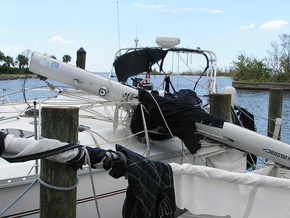
1. Ideally pick a good time to take the jib down — the best time is when you have no breeze or a light breeze – and it’s best if it’s not behind you, but it’s less critical as long as it’s light. If you’re in a crunch to remove it immediately before a hurricane, you may have to take whatever winds the weather offers. It might require more than two people to keep it corralled.
2. Unfurl the jib all the way and pull the jib tight as if you’re on a beat. After it begins to come down, loosen one jib line and tighten the other so that the jib is centered and it comes down centered on the boat as opposed to off one side.
3. One person releases the jib halyard slowly, the other person, standing at the forestay, can pull the jib down through the track.
4. As it comes down slowly, try to flake the jib on the deck the best you can — I think in all the times we’ve done this, we’ve succeeded in flaking the jib good enough to get it in the sail bag maybe one time. Just make sure it comes down slowly and you flake it as neatly on the deck as possible. Flaking isn’t difficult, it’s merely laying it in accordian pleats so it folds and isn’t crushed in a big heap when you get done.
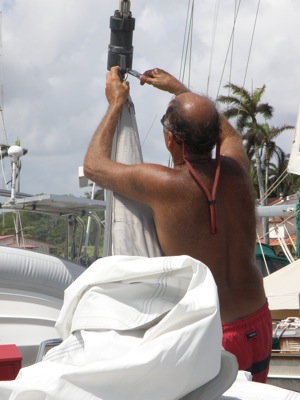
5. Unshackle the top of the sail from the roller furling. Also unhook the jib halyard from the roller furling – be sure to secure the jib halyard to a nearby lifeline or somewhere to keep it from getting away.
6. Unshackle the sail from the bottom of the roller furling mechanism.
7. We then lock the roller furling sans sail in place using a shackle, lining up a couple of holes so it can’t unwind.
8. Now we re-flake/re-fold the jib and rolling it to be stowed below. Sometimes, if convenient, we find it easier to flake off the boat on the dock, but however works for you.
9. The jib lines are then removed from the jib – if they haven’t already been disconnected and stowed with the jib sail.
10. We always remove our main as well, some people prefer to just wrap the main with extra line, but
If we knew were were in risk of a direct hit, we would consider raising all our halyards to the top of the mast reducing more windage. We haven’t done this since we leave the boat for six months at a time, but we do take extra special care to secure halyards to they’re not flopping around and chafing on anything.
If you don’t have time to neatly flake and stow the jib and roll the main, just stuff them below and deal with them later – that’s what happened during Hurricane Charley. We were negligent in not already having our sails off and our caretaker was busy yanking as many sails off boats he watched and stuffing them below as he could do in the short notice Charley gave when taking a hard right hook into Punta Gorda rather than tracking further up the coast as forecast for days.
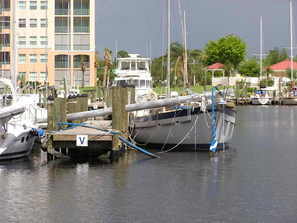
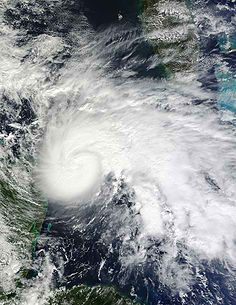
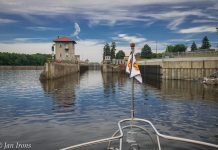

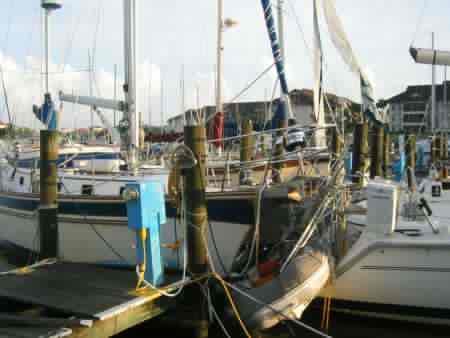








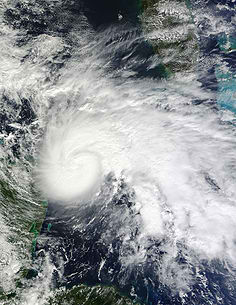
A trick we learned from other cruisers is when unrolling it to take down, do it on the “wrong” side of the boat, so that the jib is backwinded. That way, it’s easier to keep it on deck as it comes down, as it’s blowing over the deck, not the water!
-C
We’re newbie cruisers, on our Pacific Seacraft 34 for just over a month now. We’re sitting in Cambridge, MD, a few miles up the Choptank River from the Chesapeake Bay.
And we’re now reviewing our storm prep options as we wait to see what Hurricane Joaquin will do. But if my wife had not added to them with some Internet research, I’m fairly certain the importance of reducing windage would probably have eluded me.
So thank you for sharing your pre-storm advice about the roller furler.
Stay safe Mike! All windage off, be sure to have double lines and adequate chafing material on each — more here: http://commutercruiser.com/free-hurricane-info-links-here/
P.S. I love your boat! We strongly considered a PC 34 when we bought Winterlude (a Passport 37).
Hoping Joaquin veers out into the Atlantic! Cheers! Jan
Jan, we’ll take a look at the link. Thank you for sending it.
Yes, when we first started researching boats, we knew we’d want one that would forgive our inevitable mistakes. And now that we own Meander, we’re trying to make as few as possible. 🙂